
www.thornwalker.com/ditch/snieg_downing.htm
The Downing
Street memos
and Nuremberg:
The illegality
of the war on Iraq
By STEPHEN J. SNIEGOSKI
| If you find this essay of value, please send a donation of $3 to TLD. More information appears below. |
The American Establishment has conventionally praised and invoked the 1945-46 Nuremberg trial of the Nazi leadership as a model for bringing international criminals to justice. But what if the same standards applied at Nuremberg were also applied to current U.S. policy? And a parallel trial were convened? In such a proceeding, would American leaders fare any better than the captured German leadership?
As Francis A. Boyle, a professor of international law at the University of Illinois College of Law, puts it: "Of course the great irony of today's situation is that six decades ago at Nuremberg, representatives of the U.S. government participated in the prosecution, punishment and execution of Nazi government officials for committing some of the same types of heinous international crimes that members of the Bush Jr. administration currently inflict upon people all around the world." [1]
One can well imagine the shocked reaction to that statement: How dare one
compare the democratic United States to Nazi Germany — whose very
name has come to symbolize the ultimate in human evil! It's more outlandish
than Amnesty International's comparison of America's secret prisons to the
Soviet Gulag, which drew so much hostile flak from Establishment figures.
But such indignation and astonishment would only expose an ignorance both of
history and of the tenets of international law. It is true that the ignorant
would be in exalted company. A question on the legality of
American actions elicited this wisecrack from America's chief executive,
George W. Bush: "International law? I'd better call my lawyer." [2]
When people today think of Nazi criminality they think of the mass extermination of Jews: gas chambers, human soap, millions of bodies
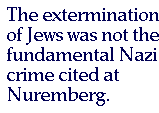 turned to ash in factory-like death camps. But the fact, which has largely
been tossed down the memory hole, is that the extermination of Jews was not
the fundamental Nazi crime cited at Nuremberg. Nor was it even the murder of
noncombatant gentiles in addition to Jews. Rather, the major crime was the
making of "aggressive war" — also referred to as "crimes against
peace."
turned to ash in factory-like death camps. But the fact, which has largely
been tossed down the memory hole, is that the extermination of Jews was not
the fundamental Nazi crime cited at Nuremberg. Nor was it even the murder of
noncombatant gentiles in addition to Jews. Rather, the major crime was the
making of "aggressive war" — also referred to as "crimes against
peace."
The Declaration in the Judgment of the International War Crimes Tribunal at Nuremberg in 1946 enunciated: "To initiate a war of aggression is the supreme international crime, differing only from other war crimes in that it contains within itself the accumulated evil of the whole." [3]
In the opening speech of the Nuremberg Tribunal, U.S. Supreme Court Justice Robert H. Jackson, the chief American prosecutor, asserted: "It is not necessary among the ruins of this ancient and beautiful city with untold members of its civilian inhabitants still buried under its rubble, to argue the proposition that to start or wage an aggressive war has the moral qualities of the worst of crimes." [4]
"This trial," Jackson went on to proclaim, "represents mankind's desperate effort to apply the discipline of the law to statesmen who have used their powers of state to attack the foundations of the world's peace and commit aggressions against the right of their neighbors." [5]
In response to the idea that Germany might have had some justified grievances in launching a war, Jackson argued "that to plan, prepare, initiate, or wage a war of aggression ... is a crime." He identified several actions as aggression, and therefore crimes against peace, including invasion of the territory of another state and attack by armed forces on the territory of another state. It is noteworthy that Jackson added: "It is the plot and the act of aggression which we charge to be crimes. Our position is that whatever grievances a nation may have, however objectionable it finds the status quo, aggressive warfare is an illegal means for settling those grievances or for altering those conditions." [6]
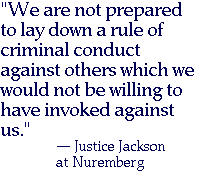 Standards were set that were exceedingly tough for those charged with
"crimes against peace." It wasn't only the political leadership that was
punished for that crime; the German military hierarchy was similarly
penalized. And active support of a policy was not necessary for conviction
— obeying orders of a superior meant culpability. Thus, charges of
criminality against Admiral Erich Raeder, commander-in-chief of the German
Navy from 1928 to 1943, included his acquiescing in Hitler's attack on the
Soviet Union, despite the fact that Raeder "endeavoured to
dissuade Hitler from embarking upon the invasion of the U.S.S.R." [7]
Standards were set that were exceedingly tough for those charged with
"crimes against peace." It wasn't only the political leadership that was
punished for that crime; the German military hierarchy was similarly
penalized. And active support of a policy was not necessary for conviction
— obeying orders of a superior meant culpability. Thus, charges of
criminality against Admiral Erich Raeder, commander-in-chief of the German
Navy from 1928 to 1943, included his acquiescing in Hitler's attack on the
Soviet Union, despite the fact that Raeder "endeavoured to
dissuade Hitler from embarking upon the invasion of the U.S.S.R." [7]
Critics of the Nuremberg Trial have charged that it simply represented
"victor's justice" — that it was just a means of punishing the vanquished
under the trappings of legality. However, the Trial's proponents insisted on
the universal applicability of its principles. Jackson solemnly pronounced that
"if certain acts in violation of treaties are crimes, they are crimes whether
the United States does them or whether Germany does them, and we are not
prepared to lay down a rule of criminal conduct against others
which we would not be willing to have invoked against us." [8]
Since comparable international trials were not conducted against the victorious Allies, which had engaged in numerous questionable activities, it is apparent that Jackson's universal principle was not actually applied in the aftermath of World War II. Even many adherents of Nuremberg acknowledged that the trial administered imperfect justice. But it was the fond hope of Jackson and other believers in global peace that international law would prevail in the future as a means of achieving world peace.
In 1945, the principle against aggressive warmaking was enshrined in the United Nations Charter, the most authoritative document in existing international law. That Charter, in Chapter I, prohibits the "use of force" against a sovereign state when that state has not committed aggression against other states. [9] The Charter would seem to allow for making war only under two circumstances: A country may engage in war defensively, in response to an armed attack; or when authorized to do so by the Security Council under Article 42 of the Charter.
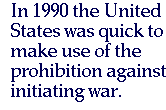 In 1990 the United States was quick to make use of the prohibition against
initiating war in order to induce the United Nations to condemn Saddam
Hussein's invasion of Kuwait and authorize the use of force to oust Iraqi
forces from that emirate.
In 1990 the United States was quick to make use of the prohibition against
initiating war in order to induce the United Nations to condemn Saddam
Hussein's invasion of Kuwait and authorize the use of force to oust Iraqi
forces from that emirate.
However, in 1999 the United States, acting under the auspices of NATO, attacked Yugoslavia, which was not engaging in any external aggression but instead was trying to suppress an internal insurrection within its national boundaries in Kosovo — an insurrection fomented partly by the CIA. [10] Washington did not seek permission from the United Nations.
Proponents of the U.S. attack tried to argue that Yugoslav brutality, which they called "genocide," justified a "humanitarian" war. Whether or not such an attack on a sovereign state was justified for such reasons, it certainly violated both the UN Charter and the Nuremberg principles. [11] And given the fact that the atrocity claims were much exaggerated, falling far short of genocide, the humanitarian claim itself was highly questionable, in context.
A few years later, Washington attempted to justify its attack on Iraq by citing Saddam's alleged possession of an arsenal of weapons of mass destruction (WMDs), which made the dictator such an immediate threat to the United States as to require a pre-emptive attack on his country. In September 2002, Richard Falk, professor of international law and practice at Princeton University, said:
The essential Bush argument is that Iraq is acquiring weaponry of mass destruction including nuclear weaponry, that its past behavior suggests that it will likely use such weaponry against American targets or transfer the weaponry to terrorist groups that will strike, and that therefore to avoid such catastrophic harm it is necessary to act in anticipation. The evidence as to acquisition is skimpy and speculative, at best, with most assessments suggesting that Iraq would lack any capacity to produce nuclear weapons for five years or more, and would then possess only a nominal capability. Furthermore, the contention that Iraq would threaten or use such weapons, and especially against the United States, completely fails any test of credibility. [12]
That being so, Falk wrote, "If the White House defiantly goes ahead with its
war plans, the United States would find itself cast in the role of being a menace to world order, an enemy of humanity, as well as being
guilty of Crimes Against the Peace in a Nuremberg sense." [13]
In response to Anglo-American claims that Saddam had rearmed with WMDs, the UN Security Council adopted Resolution 1441 in November 2002. The resolution warned of "serious consequences" for Iraq if it did not comply with UN resolutions that prohibited Iraq from possessing such weapons. UN weapons inspectors under the leadership of Hans Blix returned to the country to determine compliance. Blix's team, however, was unable to confirm that Iraq was rearming with WMDs. But before the UN inspectors could complete their nationwide inspection, President Bush in March 2003 claimed that the danger was so immediate that the United States could not wait until they finished, and he authorized the American attack.
The U.S. government held that Resolution 1441 gave it the legal right to attack Iraq. But that was a very self-serving mal-interpretation. The resolution included no provision authorizing the use of military force. If the UN were going to authorize a war against Iraq, the Security Council would have had to approve such a measure; and in the weeks leading up to the invasion, it was clear that too much opposition existed within the Security Council. Vetoes by permanent members were expected.
Moreover, the administration's argument implied that the United States had the right to unilaterally interpret and militarily enforce UN resolutions, a right that the United States would not concede to any other country. Imagine the horrified reaction of Washington if any country tried to enforce UN resolutions affecting Israel.
On the eve of the Anglo-American attack, the illegality of the venture was emphasized in the March 18, 2003, resignation letter of Elizabeth Wilmshurst, deputy legal advisor to the British Foreign Office: "I cannot in conscience go along with the advice ... which asserts the legitimacy of military action without such a [Security Council] Resolution, particularly since an unlawful use of force on such a scale amounts to a crime of aggression." [14]
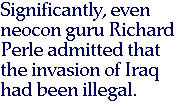 Former UN Secretary-General Boutros Boutros-Ghali echoed Wilmshurst's
conventional interpretation of aggressive war, stating at the time of the
March 2003 invasion: "I believe that this intervention is a violation of
the charter of the United Nations.... I believe that pre-emptive attack is in
basic contradiction with the Charter of the United Nations. The Charter of the
United Nations [says] you cannot use military forces, or even the
threat to use forces, without the agreement of the Security Council." [15]
Former UN Secretary-General Boutros Boutros-Ghali echoed Wilmshurst's
conventional interpretation of aggressive war, stating at the time of the
March 2003 invasion: "I believe that this intervention is a violation of
the charter of the United Nations.... I believe that pre-emptive attack is in
basic contradiction with the Charter of the United Nations. The Charter of the
United Nations [says] you cannot use military forces, or even the
threat to use forces, without the agreement of the Security Council." [15]
When pressed on whether the attack on Iraq was illegal, UN Secretary-General Kofi Annan said: "Yes, if you wish. I have indicated it was not in conformity with the UN charter from our point of view, from the charter point of view, it was illegal." [16]
Significantly, even neocon guru Richard Perle admitted that the invasion of
Iraq had been illegal according to the tenets of existing international law. He
acknowledged that "international law ... would have required us to leave Saddam Hussein alone," but he went on to declare that
"international law stood in the way of doing the right thing." [17]
It is plain, then, that people knowledgeable about international law considered the attack on Iraq to be illegal long before the Downing Street memos came to light in 2005. But the leaked memos further confirm the war's illegality.
First, they confirm that the Bush administration had decided to attack Iraq and overthrow Saddam before Blix's inspectors ever set foot in Iraq. In short, not finding any WMDs would not prevent a U.S. attack.
Moreover, the memos show that the United States was not really concerned about the danger from Saddam's WMDs. The British Cabinet memo of July 23, 2002, explained that the attack would be "justified by the conjunction of terrorism and WMD" and that "the intelligence and facts were being fixed around the policy." In short, policy shaped intelligence; intelligence did not shape policy. The United States did not go to war because the facts, objectively analyzed, pointed to a grave danger from Saddam's WMDs necessitating a pre-emptive attack; rather, the intelligence evidence was selected, interpreted, and presented in such a way as to justify a decision to invade that had already been made. Saddam's alleged WMDs provided the pretext, not the cause, for the U.S. attack on Iraq.
Given less attention in news accounts than the business about "fixed" intelligence was the memos' discussion of the pre-war bombing campaign, which amounted to even greater evidence of an American war of aggression. As John Prados, a senior fellow with the National Security Archive in Washington, writes: "The now-notorious Downing Street memos make it necessary to reframe the story of the aerial operations that took place before the war, with significant new conclusions emerging. It now appears that the United States, dragging a reluctant Great Britain behind it, executed a deliberate, purposeful bombing campaign against Saddam Hussein's Iraq beginning in May 2002." [18]
 At that time, the Bush administration contended that the bombing was
simply a means to enforce the so-called no-fly zones. There were two such
zones, one in the north and the other in the south, covering altogether more
than half of Iraq. The zones were unilaterally imposed by the Bush I
administration after the Gulf War of 1991 for the express purpose of
preventing Saddam from using his air force against Kurds in northern Iraq and
against Shiite Muslims in the south. The bombing campaign that would begin in
May 2002 would occur in the southern no-fly zone and hence would be
designated Operation Southern Focus.
At that time, the Bush administration contended that the bombing was
simply a means to enforce the so-called no-fly zones. There were two such
zones, one in the north and the other in the south, covering altogether more
than half of Iraq. The zones were unilaterally imposed by the Bush I
administration after the Gulf War of 1991 for the express purpose of
preventing Saddam from using his air force against Kurds in northern Iraq and
against Shiite Muslims in the south. The bombing campaign that would begin in
May 2002 would occur in the southern no-fly zone and hence would be
designated Operation Southern Focus.
The legality of the no-fly zones was highly questionable to begin with. Washington claimed that the zones represented the enforcement of UN resolutions on Iraq, but the United Nations never actually authorized the establishment of the zones. The zones' doubtful legality aside, the extensive bombings went far beyond their alleged purpose of protecting oppressed groups in Iraq. As the Downing Street memos confirm, the bombings, which British Defense Secretary Geoffrey Hoon called "spikes" of air activity, were actually systematic assaults on Iraq's capacity to defend itself. They were intended to weaken Iraq for an all-out invasion and to provide a casus belli if Iraq attempted to retaliate. [19]
Bombing another country to prepare it for a later attack is, naturally, an act of aggressive war. Michael Smith, the writer on defense issues for the Times of London who originally got hold of the memos, noted that the British Foreign Office considered the 2002 raids illegal by the standards of international law. Foreign Office legal advisors, he wrote, "made it clear allied aircraft were legally entitled to patrol the no-fly zones over the north and south of Iraq only to deter attacks by Saddam's forces on the Kurdish and Shia populations." [20]
Prados concluded in a similar vein: "Southern Focus clearly had the function of facilitating an invasion but was in itself an act of war. Saddam Hussein never did react to the strikes in such a fashion as to provide Bush with a casus belli, but the attacks continued until the very moment of the March 2003 invasion.
"Operation Southern Focus furnishes yet more evidence that
George W. Bush, while talking diplomacy, pursued an aggressive war." [21]
In the case of Nazi Germany, the law on initiating war was not as clear-cut as it became in the post-World War II period, with the establishment of the United Nations Charter. Nowadays international law is presumably sacrosanct as applied to the actions of foreign leaders, who risk being seriously punished for violating it. Certainly the United States continues to pontificate about alleged violations of international law by other countries. "We've created a set of rules" for international relations, observes Steven Miller, editor-in-chief of International Security, the pre-eminent American journal on global security issues, "and one of the rules is that rules are for others." [22]
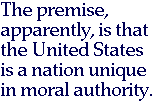 The premise, apparently, is that the United States is a nation unique in moral authority. Nothing could be wrong with the initiation of force by the all-beneficent United States, which properly uses it to mete out just punishment
to evildoers. In this utopian context one may recall the initial name for the
military campaign in Afghanistan: "Operation Infinite Justice."
The premise, apparently, is that the United States is a nation unique in moral authority. Nothing could be wrong with the initiation of force by the all-beneficent United States, which properly uses it to mete out just punishment
to evildoers. In this utopian context one may recall the initial name for the
military campaign in Afghanistan: "Operation Infinite Justice."
The purpose of all of America's actions is, of course, to preserve "peace." One thinks of what Tacitus said about Roman policy: "They create a desolation and call it peace."
President Bush seemingly believes that he is God's instrument to punish evildoers and establish justice upon the Earth. Undoubtedly all "great," or at least powerful, leaders — Hitler, Stalin, Genghis Khan — believed that they were performing some cosmic good in their conquests.
But no matter how positively the United States advertises itself and its motives, it has violated the same precepts of international law for which the Nazi leaders, and even some men who were not among the chief leaders, were severely punished. Not to worry, though: the United States can get away with its violations of international law. Unlike Nazi Germany, it has yet to be conquered by its enemies.
Consequently, war-crimes charges against Washington are brought only by powerless private groups such as the recent World Tribunal on Iraq that wound up its deliberations in Istanbul, Turkey. [23] That trial was ignored by the American mainstream media. Undoubtedly, many of its participants were anti-American from snout to tail; but the Nuremberg judges were hardly paradigms of impartial justice, either. (The German defendants were not allowed to argue in their defense that the Allies had committed the same acts for which they were being tried.) In any case it is certain that if the Nuremberg standards were applied in an objective fashion the current American leadership would be convicted of having launched a war of aggression.
 But none of that is of any importance to America's current
leadership. As John Bolton, Bush's nominee as ambassador to the
United Nations, has stated: "It is a big mistake for us to grant any validity to
international law." [24] We may be grateful to
Bolton for boldly and explicitly articulating the philosophy of U.S. state
managers. Judging from the American example, we must conclude that the
only punishable "crime" in the struggle among nation-states is to lose a
war.
But none of that is of any importance to America's current
leadership. As John Bolton, Bush's nominee as ambassador to the
United Nations, has stated: "It is a big mistake for us to grant any validity to
international law." [24] We may be grateful to
Bolton for boldly and explicitly articulating the philosophy of U.S. state
managers. Judging from the American example, we must conclude that the
only punishable "crime" in the struggle among nation-states is to lose a
war.
In light of that rule, it is easy to understand why other countries scramble to equip themselves with the most powerful weapons they can lay their hands on.
July 13, 2005
© 2005 WTM Enterprises. All rights reserved.
If you found this article to be interesting, please donate to our cause. You should make your check or m.o. payable in U.S. dollars to WTM Enterprises and send it to:
WTM Enterprises
P.O. Box 224
Roanoke, IN 46783
Thanks for helping to assure a future for TLD!
Notice to visitors who came straight to this document from off site: You are deep in The Last Ditch. You should check out our home page and table of contents.